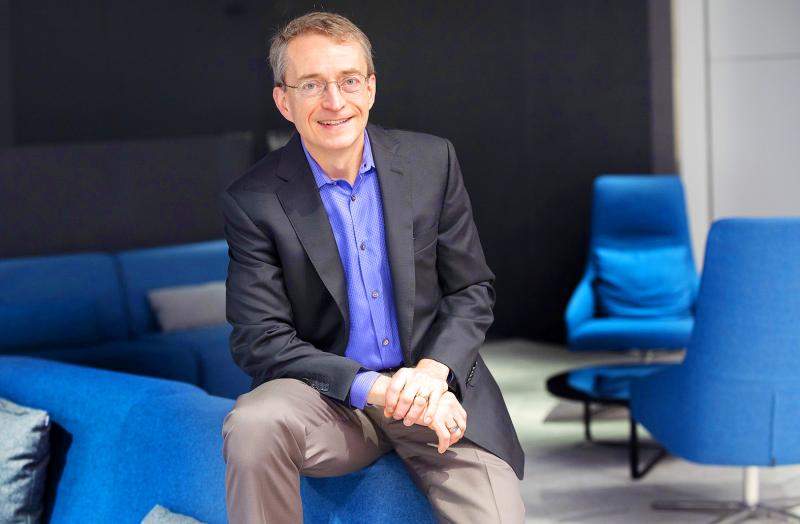Taiwan Semiconductor Manufacturing Co (TSMC, 台積電) is an important and long-term partner, Intel Corp chief executive officer Pat Gelsinger said yesterday upon arriving in Taiwan on a trip that is widely believed to be a quest to secure the Hsinchu-based chipmaker as a supplier of advanced 3-nanometer chips.
The move would seem to backtrack Gelsinger’s remarks that Taiwan is geopolitically unsafe, and that the US should not overly depend on Asia for semiconductors, but should invest more in the country’s homegrown chipmakers.
With the construction of a new fabrication factory in Phoenix, Arizona — its first major expansion overseas — TSMC is vying for US government subsidies to roll out 5-nanometer chips at the fab by 2024. The firm hopes that subsidies and incentives will help cut the cost of manufacturing in the US.

Photo courtesy of Intel Corp
Yesterday, Gelsinger addressed the importance of local supply chains, saying that Taiwan is also home to more than 1,000 Intel employees who have been working closely with “our Taiwan customers and partners for the last 36 years to deliver leadership products.”
“Prominent among these partnerships is our long-standing relationship with TSMC. TSMC has unlocked the magic of silicon for us and others in the industry in so many ways, creating products that would otherwise never have existed,” he said in a prerecorded video. “What TSMC has done is spectacular.”
Although Gelsinger has not revealed the reason behind his visit, industry insiders and analysts believe that he came for TSMC’s 3-nanometer chips, which are to be the most advanced chips when they become available in the second half of next year.
“Obviously, Gelsinger came to Taiwan to secure a supply of advanced chips from TSMC,” Cornucopia Capital Partner Ltd (聚芯資本) managing partner Eric Chen (陳慧明) said by telephone yesterday.
With the 3-nanometer chips, TSMC “will play a key role in helping Intel fend off competition from AMD [Advanced Micro Devices Inc] in the CPU [computer processing unit] segment, in particular,” Chen said.
Intel makes chips at its own factories, but it has lagged behind TSMC by about two years in migrating to next-generation process technologies, Chen said.
AMD, one of TSMC’s major clients, is usually the first adopter of TSMC’s most advanced chips, along with Apple Inc.
TSMC and Intel declined to comment on what their executives would discuss.
Gelsinger said that Taiwan — home to an entire, vibrant ecosystem that has woven technology, culture, business and competition into a hub of the semiconductor industry — is at the heart of much of the innovation transforming digitization.
Now, more than ever, semiconductors are in the spotlight, he said, adding that without semiconductors, everything stops.
To tackle the global chip crunch, Intel must have factories in multiple geographic locations — here in Taiwan and in other key locations around the world, he said, adding that Intel would continue to invest in Taiwan.

CHAOS: Iranians took to the streets playing celebratory music after reports of Khamenei’s death on Saturday, while mourners also gathered in Tehran yesterday Iranian Supreme Leader Ayatollah Ali Khamenei was killed in a major attack on Iran launched by Israel and the US, throwing the future of the Islamic republic into doubt and raising the risk of regional instability. Iranian state television and the state-run IRNA news agency announced the 86-year-old’s death early yesterday. US President Donald Trump said it gave Iranians their “greatest chance” to “take back” their country. The announcements came after a joint US and Israeli aerial bombardment that targeted Iranian military and governmental sites. Trump said the “heavy and pinpoint bombing” would continue through the week or as long

TRUST: The KMT said it respected the US’ timing and considerations, and hoped it would continue to honor its commitments to helping Taiwan bolster its defenses and deterrence US President Donald Trump is delaying a multibillion-dollar arms sale to Taiwan to ensure his visit to Beijing is successful, a New York Times report said. The weapons sales package has stalled in the US Department of State, the report said, citing US officials it did not identify. The White House has told agencies not to push forward ahead of Trump’s meeting with Chinese President Xi Jinping (習近平), it said. The two last month held a phone call to discuss trade and geopolitical flashpoints ahead of the summit. Xi raised the Taiwan issue and urged the US to handle arms sales to

State-run CPC Corp, Taiwan (CPC, 台灣中油) yesterday said that it had confirmed on Saturday night with its liquefied natural gas (LNG) and crude oil suppliers that shipments are proceeding as scheduled and that domestic supplies remain unaffected. The CPC yesterday announced the gasoline and diesel prices will rise by NT$0.2 and NT$0.4 per liter, respectively, starting Monday, citing Middle East tensions and blizzards in the eastern United States. CPC also iterated it has been reducing the proportion of crude oil imports from the Middle East and diversifying its supply sources in the past few years in response to geopolitical risks, expanding

Pro-democracy media tycoon Jimmy Lai’s (黎智英) fraud conviction and prison sentence were yesterday overturned by a Hong Kong court, in a surprise legal decision that comes soon after Lai was jailed for 20 years on a separate national security charge. Judges Jeremy Poon (潘兆初), Anthea Pang (彭寶琴) and Derek Pang (彭偉昌) said in the judgement that they allowed the appeal from Lai, and another defendant in the case, to proceed, as a lower court judge had “erred.” “The Court of Appeal gave them leave to appeal against their conviction, allowed their appeals, quashed the convictions and set aside the sentences,” the judges